
By Robert St. Martin
North Hollywood, California (The Hollywood Times) 08/15/2024

Last Friday at the Laemmle NoHo in North Hollywood was the opening night of a week-long run of a new film The Long Walk of Carlos Guerrero (2024), directed by New York-based Indian filmmaker Joseph Mathew-Varghese. In 2004, director Varghese went to southern Arizona after hearing about the rising death toll of migrants in the desert. That one trip turned into a three-year odyssey to make the documentary, Crossing Arizona (Sundance 2006). During this time, he learned and experienced an up-close look at how U.S. border enforcement policies were driving migrants into the most treacherous parts of the Sonoran desert.
The Long Walk of Carlos Guerrero is a fictionalized account rooted in true migrant stories from the Arizona borderlands, featuring appearances by real humanitarian-aid workers from Tucson and Green Valley. The film stars Jonathan De La Torre as Carlos Guerrero, an undocumented Mexican man attempting to return to his wife in United States along with Jocelyn Sanchez as a 13-year-old Salvadorean refugee. The story focuses on this undocumented immigrant who is a successful New York City chef, who returns to Mexico to visit his ill mother and then crosses illegally to re-enter the United States.
The film that chronicles the “hero’s journey” of an undocumented New York City chef, on a harrowing trip through the Southern Arizona desert, aims to celebrate the contributions of undocumented immigrants to American society and to humanize migrants too often treated as political props, says filmmaker Varghese, who actually grew up in India. Mathew assured that as an immigrant this issue is something that reaches “deeply to his soul.” “Undocumented immigrants in the United States have very few rights and live in constant fear. However, something that is not talked about much are the consequences that they suffer in silence for being undocumented, such as not having contact with their families, not being able to return to their countries to see their parents, siblings, even wives or children.”
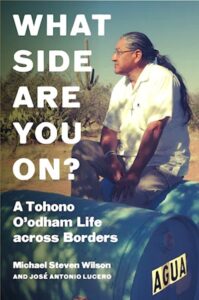
The film features Mike Wilson, a local activist who for years left containers of water inside the Tohono O’odham Indian Reservation in the Arizona desert in order to save the lives of migrants trying to cross the Arizona desert. irregular shape. even features local humanitarian aid volunteers, from Humane Borders and other groups – playing themselves in his movie – in order to highlight their work. Volunteers often spend several hours at or near the border, giving migrants water and food. The inhospitable Sonoran desert which makes up the Tohono O’odham Indian Reservation continues to see thousands of migrants cross, and die in, the desert.
Mike Wilson worked more than a decade with Humane Borders, putting out water tanks for migrants on the Tohono O’odham Nation which stretches from Tucson all the way to the Mexican border. Wilson, grew up in poverty in the south of Tucson and after getting a college degree eventually served in U.S. Special Forces in El Salvador who he acquired fluent Spanish. Wilson recalled in the Q&A that “I told him, ‘Joseph, I am not an actor,’” and that Matthew-Varghese replied, ‘Mike, I don’t want Mike an actor. I want Mike Wilson exactly the way you are.’”
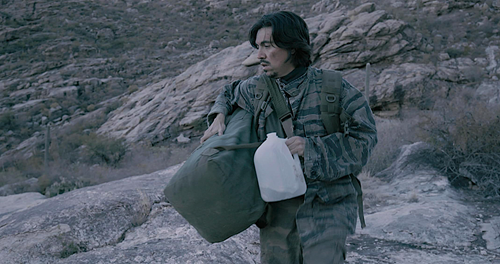
The performance of Jonathan De La Torre as Carlos Guerrero marks his fine acting in this feature-length film, as captured by the camera in close-up as well as his very physical presence in the film. The cast includes Rogelio Camarillo Jr., an international bilingual actor and writer, as Viento, the tricky “coyote” who leads the group of migrants across into the United States from Mexico. There is also Michael G. Martinez, as the “mule” dragging a huge backpack of drugs across the border. Young Salvadorean refugee Catalina is accompanied by her mother Sofia (Maribel Jimenez) until she disappears and is left for dead in the desert.
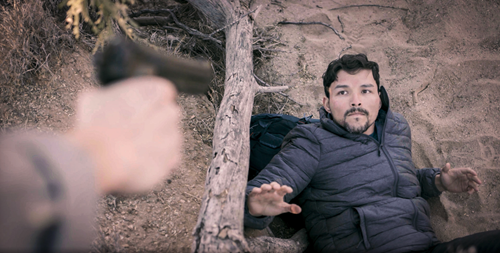
Aspects of the story may not seem new, as they have been documented in other films, but the close observation given to the lead characters Carlos and Catalina makes this film riveting. We really do experience their shared experience of five long days and nights in the Sonoran desert as they attempt to make it to a place with water and food. The camera work of director Joseph Mathew-Varghese is impressive. The film also captures the austere beauty of the Sonoran desert and its harsh environment as well as the contrast between that forbidding landscape and the comforts of rescue operations in Tucson and that part of Arizona.
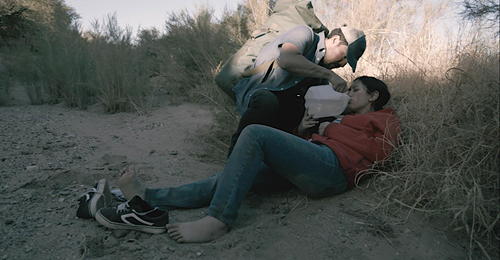
Renowned human rights activist Michael “Mike” Wilson has borne witness to the profound human costs of poverty, racism, border policing, and the legacies of colonialism. From a childhood in the mining town of Ajo, Arizona, Wilson’s life journey led him to US military service in Central America, seminary education, and religious and human rights activism against the abuses of US immigration policies. With increased militarization of the US-Mexico border, migration across the Sonoran Desert (which is the home of the Tohono O’odham Nation) surged, as did migrant deaths and violent encounters between tribal citizens and US Border Patrol agents. When Wilson’s religious and ethical commitments led him to set up water stations for migrants on the Nation’s lands, it brought him into conflict not only with the US government but also with his own tribal and religious communities.
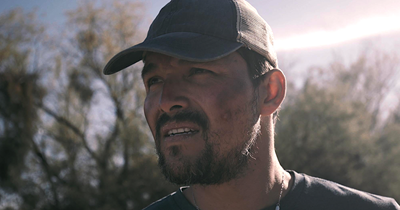
At the Q&A after the screening of The Long Walk of Carlos Guerrero, Mike White shared his new book What Side Are You On: A Tohono O’odham Life Across Borders (North Carolina Press, 2024). This richly textured and collaboratively written memoir brings Wilson’s experiences to life. Joining Wilson as coauthor, José Antonio Lucero adds political and historical context to Wilson’s personal narrative. Together they offer a highly original portrait of an O’odham life across borders that sheds light on the struggles and resilience of Native peoples across the America.
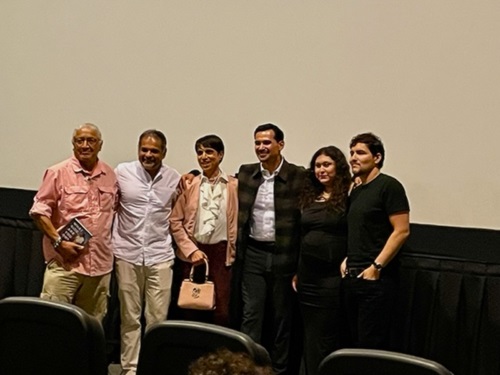
At the Q&A after the film on Friday night, director Matthew-Vorghese and activist Mike Wilson explains that they are taking the film on a university viewing circuit to introduce both the film and the book to various audiences.